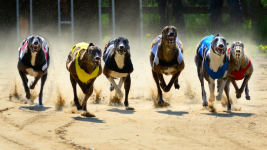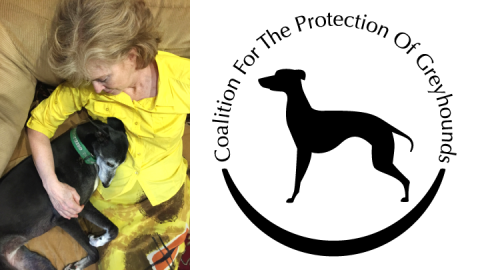Calls to Ban Greyhound Racing Continue: An Interview With CPG’s Fiona Chisholm

In a move described as “the mother of all backflips”, former NSW premier Mike Baird reversed a ban on greyhound racing in October 2016, despite his government only having passed the prohibition, set to come into effect in July 2017, three months earlier.
Set out in the McHugh report, the findings of the NSW Special Commission of Inquiry into the Greyhound Racing Industry prompted the ban.
The report set out that of the 97,783 greyhounds bred for racing over the 12 years prior, between 48,891 and 68,448 were killed because they were deemed uncompetitive.
Indeed, under Baird’s successor Gladys Berejiklian, the Liberal Nationals government in 2018 handed over half a million dollars in prize money to contribute to the creation of the world’s richest greyhound racing event, that being Wentworth Park’s Million Dollar Chase.
However, according to the Coalition for the Protection of Greyhounds (CPG), despite some improvements that were forthcoming following the inquiry, cruelty still pervades the industry, and most of the public want to see the practice brought to an end.
Abusing canines
The NSW government launched the statewide e-tracking of greyhounds in June, which, it maintains, entails monitoring a dog’s location and welfare from birth to retirement in an effort to stamp out the industry practice of destroying unwanted animals.
CPG counters the government’s assertions though, as it posits that the tracking system that’s been rolled out isn’t “whole-of-life”, as it leaves a number of accountability loopholes, which can lead to dogs disappearing into thin air.
Another recent development has seen the NSW greyhound industry, with the aid of the state agriculture minister, successfully block a move to outlaw the practice of surgical artificial insemination.
Prohibited in other nations, surgical artificial insemination involves cutting open a female dog’s abdomen during ovulation and directly injecting semen into her uterus. The procedure currently accounts for around 80 percent of greyhound breeding in NSW,
Greater protections
CPG was established in 2015, after Four Corners revealed that live baiting, the illegal practice of using live animals to train greyhounds, was continuing to be practised within this state’s industry.
And it was these revelations that led to the establishment of the commission of inquiry.
The greyhound welfare organisation has outlined five key demands it’s calling on the state to legislate if it refuses to ban dog racing. These include implementing whole-of-life tracking, funding rescues and sanctuaries, increasing penalties, reducing greyhound breeding and making tracks safer.
Sydney Criminal Lawyers spoke to CPG NSW director Fiona Chisholm about the industry continuing to assert that it has the public’s support when the majority wants to see greyhound racing brought to an end, along with those loopholes that lead to the continued extermination of the dogs.
Two weeks ago, Tony Mestrov was about to leave his position as CEO of Greyhound Racing NSW, when he remarked that “once the community understood the industry was serious about welfare, it let things like the Million Dollar Chase be the success it has been”.
Fiona, this statement has drawn the ire of the Coalition for the Protection of Greyhounds. Why is that the case?
All the publicly available research shows the community does not support greyhound racing.
The public is way ahead of our politicians on animal welfare. They want better animal welfare in general, and all the surveys and polls that have been done about greyhound racing do not support it.
The Baird government passed laws in mid-2016 that banned greyhound racing as of July the following year. However, three months later, the premier said he’d gotten it wrong, and the prohibition was reversed.
The NSW government subsequently handed over half a million dollars to assist in establishing the Million Dollar Chase, the world’s richest dog race, in 2018.
Why did the government take this “mother of all backflips” on the ban?
The public record shows that at the time, the government was sliding in popularity. There was a phenomenal campaign undertaken by the industry and shock jocks. And the NSW ALP opposed it.
So, there were quite a few groups that decided to fight it.
As there was such strong opposition to the prohibition, why did the Liberal Nationals government get to the point of banning dog racing in the first place?
There wasn’t resistance from the public. An RSPCA survey done at the time showed that two out of three people in NSW and the ACT supported the ban.
Instead, the resistance that arose from vested interests with money at their disposal was very loud.
Baird’s greyhound racing ban was spurred by the findings of the mid-2016 McHugh report, which was the result of the NSW Special Commission of Inquiry into the Greyhound Racing Industry.
This investigation was established following a series of reports in the media over 2015. What did the inquiry find?
The report found systemic evidence of poor treatment of greyhounds by the industry. It found systemic evidence of lying on the part of those responsible for the welfare of the animals.
McHugh described the culture of greyhound racing in NSW as dishonest. And there was evidence given that they encouraged stewards inside greyhound racing to lie about the deaths and injuries suffered by the dogs in their reports. And this is all on the public record.
So, did these findings lead to improvements in greyhound welfare?
Yes. They led to the establishment, for the first time, of an independent government regulatory body in NSW. That’s the Greyhound Welfare and Integrity Commission (GWIC).
That has meant, firstly, vastly increased transparency about what is happening because of the release of data that was never released before and, of course, extensive inspections.
However, that said, the CPG is very unhappy with the e-tracking that the NSW government has introduced.
Regulators can only do what they are empowered to do, and the government has failed to empower the regulator to track dogs once they retire from the industry, unless they are retired to an industry participant.
So, there’s no tracking of three groups. One is pups until they are registered. So, that is a point when they can disappear. There is no tracking when they are retired to a third party by an industry participant, and that’s how greyhounds disappear.
And thirdly, the regulator has not been empowered by the NSW Government to track dogs moved interstate. As a result, nothing is known about the status of the many NSW greyhounds that end up in other states. So, there needs to be a national public register.
If the racing industry was proactive, it would make a register available to reassure the community and the government, so that when dogs are moved interstate they don’t disappear off the radar.
Just to be clear, what’s the issue with greyhounds not being registered and disappearing?
The industry breeds six times the number of greyhounds that its rehoming arm can rehome and place. Six times nationally.
So, they always have too many greyhounds and they’re always looking for new ways to get rid of them. If you look at the McHugh report, there is extensive evidence of that taking place.
In highlighting that the industry is not taking greyhound welfare seriously, you point out that the NSW industry and the state agriculture minister Dugald Saunders have ensured that a surgical breeding procedure banned overseas be allowed to continue in this country.
The procedure is called surgical artificial insemination. Why is it problematic?
This is a hugely cruel procedure that the RSPCA and the national peak body Sentient, which represents some vets, describes as cruel and unnecessary because there are better and more humane alternatives available.
So, the industry needs to explain why they’re insisting on this.
Animal Justice Party MLC Emma Hurst presented a CPG petition to NSW parliament in 2020, which garnered over 33,000 signatures opposing the draft NSW greyhound code of practice, as it would allow the industry to carry on for another 10 years without improving its substandard conditions.
The Coalition government banned greyhound racing at one point. So, what sort of political will is there to improve greyhound welfare at present?
Very little unless people start to vote Greens or the Animal Justice Party, because both those parties will take much stronger action on animal welfare.
The two major parties don’t care about animal welfare. They just want the betting revenue from animal racing.
Every ALP and Liberal/National who voted against the NSW Greens’ attempt to plug the gaps in e-tracking now has blood on their hands. They will be directly responsible when the next mass greyhound grave is found in this state.
Right now, they’re responsible for every pup that disappears before it’s entered on the tracking system, every dog sent interstate which is quietly disposed of and every dog retired by an owner or trainer to a third party, who isn’t a real adopter – just a dumping point – as Gracie’s story demonstrates.
So, the state government got to the point of actually banning greyhound racing but then the issue has been completely forgotten?
Not forgotten as such. The government has created the NSW regulator, but it has limited its powers as per e-tracking and unbelievably, the regulator is not empowered to check and enforce the minimum track standards. Instead, this is left to the NSW dog racing industry which is a farce.
Most importantly, the government has failed to deliver on the three major reforms it promised: a puppy bond, breeding caps and proper birth to death e-tracking.
The national dog racing industry body, Greyhounds Australasia, has had national breeding caps in its strategic plan for a few years, but nothing’s eventuated.
And lastly, Fiona, greyhound racing continues. The Million Dollar Chase will be held twice this year, with one race scheduled for next month. But there are those in the community who still want to see the practice come to an end.
CPG has a list of five key demands. Ultimately, what does your coalition want to see happen with the industry?
We want to see it shut down and ended across the country. While state governments refuse to recognise what the public’s attitude is to cruelty to animals and, indeed, the public attitude to greyhound racing, then we want those five demands met.








